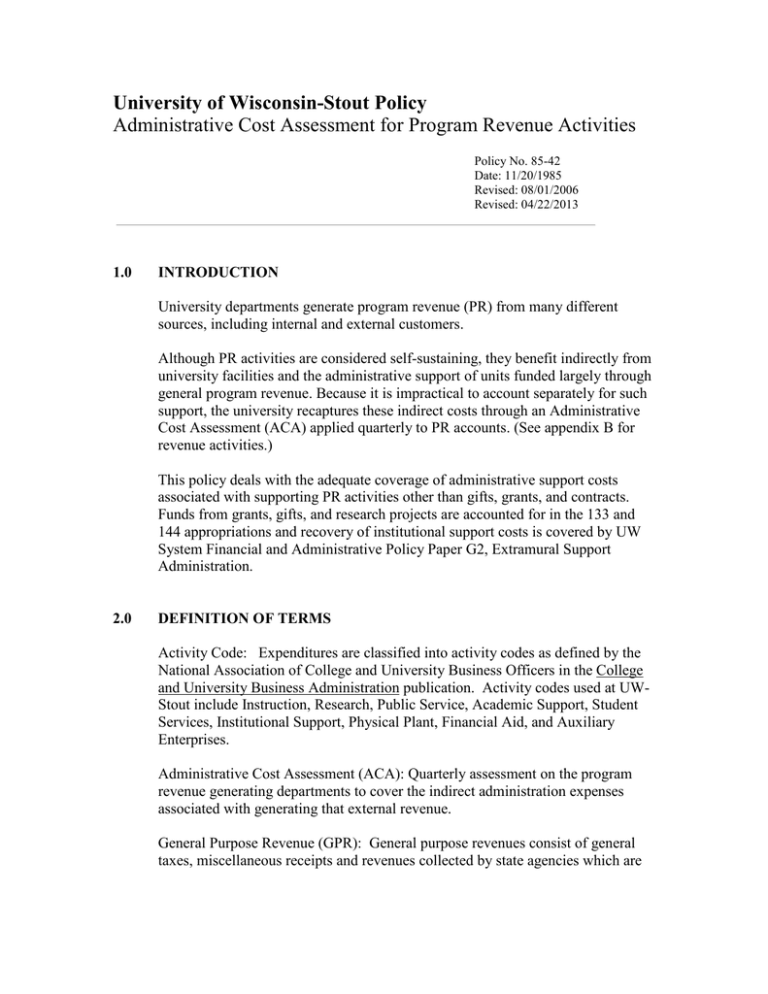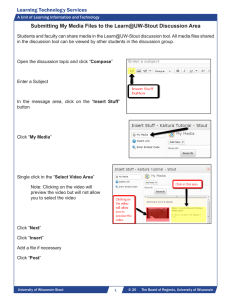University of Wisconsin-Stout Policy Administrative Cost Assessment for Program Revenue Activities
advertisement

University of Wisconsin-Stout Policy Administrative Cost Assessment for Program Revenue Activities Policy No. 85-42 Date: 11/20/1985 Revised: 08/01/2006 Revised: 04/22/2013 1.0 INTRODUCTION University departments generate program revenue (PR) from many different sources, including internal and external customers. Although PR activities are considered self-sustaining, they benefit indirectly from university facilities and the administrative support of units funded largely through general program revenue. Because it is impractical to account separately for such support, the university recaptures these indirect costs through an Administrative Cost Assessment (ACA) applied quarterly to PR accounts. (See appendix B for revenue activities.) This policy deals with the adequate coverage of administrative support costs associated with supporting PR activities other than gifts, grants, and contracts. Funds from grants, gifts, and research projects are accounted for in the 133 and 144 appropriations and recovery of institutional support costs is covered by UW System Financial and Administrative Policy Paper G2, Extramural Support Administration. 2.0 DEFINITION OF TERMS Activity Code: Expenditures are classified into activity codes as defined by the National Association of College and University Business Officers in the College and University Business Administration publication. Activity codes used at UWStout include Instruction, Research, Public Service, Academic Support, Student Services, Institutional Support, Physical Plant, Financial Aid, and Auxiliary Enterprises. Administrative Cost Assessment (ACA): Quarterly assessment on the program revenue generating departments to cover the indirect administration expenses associated with generating that external revenue. General Purpose Revenue (GPR): General purpose revenues consist of general taxes, miscellaneous receipts and revenues collected by state agencies which are paid into a specific fund, lose their identity and are then available for appropriation by the legislature. Program Revenue (PR): Term used to identify those accounts that are selfsustaining. These activities generate their own revenue through fees, user charges and sales. 3.0 STATEMENT OF POLICY It is the policy of the University of Wisconsin-Stout to adequately cover administrative support costs associated with supporting program revenue activities through an administrative cost assessment. The funds collected will be administered by the chancellor and be generally allocated to administrative support activities thus reducing their need for GPR support. 4.0 GUIDELINES FOR IMPLEMENTATION This policy will be applied to four main groups of activities usually accounted for in the 128, 129, 131, 132, 136, or 189 appropriations. 4.1 Auxiliary Operations The University of Wisconsin System subscribes to the definition of auxiliaries formulated by the National Association of College and University Business Officers (NACUBO) in the College and University Business Administration publication. NACUBO defines auxiliary enterprises as programs that “…furnish services directly or indirectly to students, faculty or staff and charge fees related to, but not necessarily equal to, the cost of services. Traditionally, these services have encompassed food services, student housing, and college stores.” For UW-Stout, there are a designated group of auxiliary activities, all classified as Activity Code (AC) 8. Auxiliary Operations are charged for institution support costs in compliance with UW System Financial and Administrative Policy F42, Auxiliary Enterprises Support Services Chargebacks and thus are exempt from this administrative cost assessment. 4.2 Segregated Fee Operations According to UW System Financial and Administrative Policy F50, Segregated University Fees, segregated fees are defined as”…charges, in addition to instructional fees, assessed to all students for student services, activities, programs and facilities that support the mission of University of Wisconsin System institutions.” At UW-Stout, segregated fees are charged to support activities such as Student Health, Intercollegiate Athletics, Recreation Complex, Student Union, Student Activities, and Municipal Services. Segregated Fee operations are accounted for in the 128 appropriation, Student Services activity code 0. Segregated Fee operations are exempt from paying institution support costs by system policy (F50; F42). 4.3 Other program revenue activities exempted from the administrative cost assessment. An activity which meets a criterion below is exempt from the administrative cost assessment. (a) The activity is a subsidized educational experience, limited to activities where the primary purpose is provision of laboratory or practicum opportunity for students participating in a credit-bearing course of study. The learning experience provided to the student is the primary purpose, with the work provided by the students being a concomitant outcome of the method of instruction. A member of the faculty or academic staff is assigned as part of his or her regular academic responsibilities to serve as organizer, instructor and evaluator of the students’ work. (or) (b) The majority of the revenue generated by the activity is derived from charging other university departments for institutional services (i.e. fleet, postage, telephone), the activity is a clearing account for passthrough expenses, the activity is funded by an administrative cost assessment, or the activity is an institutional support function. (or) (c) The non-credit service is provided directly to UW-Stout students whereby revenue is collected directly from the students. 4.4 Program revenue activities subject to an administrative cost assessment. Program revenue activities not covered above will be assessed for administrative support costs. The administrative cost assessment rate for these activities will be calculated annually at a rate adequate to cover administrative support costs incurred in generating external revenue. It follows the university’s federally approved Facilities & Administrative (F&A) rate calculation methodology which takes into account numerous indirect cost pools. The rate will be applied against revenue generated. A change to the administrative cost assessment rate must be approved by the chancellor by January 1st. Prior to this date, the controller will provide the Faculty Senate finance committee with an opportunity to review. Appendix A provides a listing of account activities and administrative cost assessment categorization. 5.0 RESPONSIBILITY FOR IMPLEMENTATION The vice chancellor for Administrative & Student Life Services or designee is responsible to determine if an activity will be assessed the administrative cost assessment. 6.0 APPEAL PROCESS Appeals to the vice chancellor’s decision can be directed to the chancellor. An appeal should be in memo form and clearly describe either how the policy does not apply to the activity or why a reduced ACA rate should be applied to the activity. Appendix A Listing of Account Activities and Administrative Cost Assessment Categorization Appendix B External Program Revenue Examples If you have questions or comments, email parq@uwstout.edu Return to Sequential Index. APPENDIX A: LISTING OF ACCOUNT ACTIVITIES AND ADMINISTRATIVE COST ASSESSMEMT CATEGORIZATION Exempt from ACA Reference Category 4.1 Auxiliaries 4.2 Segregated Fees 4.3 (a) Credit Bearing Educational Experiences 4.3 (b) Intracampus 4.3 (c) Revenue Direct from Students (Non-credit) Description Auxiliary activities classified as activity code (AC) 8 include Residence Life, University Dining, Parking, and the Campus Card Office Segregated fee revenue classified in the 128 appropriation, activity code (AC) 0 Educational experiences for students participating in a credit bearing course of study Examples: Regular Tuition Access to Learning Fees Special Course Fees E-Scholar Fees Labs Scholarships Field Trips – Optional Study Abroad Activity derived from charging other university departments for institutional services Examples: Institutional Support (HR and Payroll, Purchasing and Materials Management, Institutional Research, etc.) Internal Service (Fleet Operations, Duplicating Center, Mail Services, etc.) Clearing Accounts (PY Refund Clearing, WHEG Clearing, MN Self Loan Clearing, etc.) Overhead Accounts (Centralized Services Fee Account, ACA Account, F&A Cost Account, etc.) Non-credit service provided directly to students whereby revenue is collected directly from the students This category includes a wide range of fees collected directly form students e.g.: Examples: Orientation Fees Application Fees Testing Fees Graduation Fees Apply ACA Reference 4.4 Category All Other Program Revenue Description Program revenue generated from all other activities will be charged an administrative cost assessment Examples: Full Cost Recovery Program Revenue (Customized Instruction, Inter-Institutional Agreements, etc.) External Revenue (Camps, Conferences, Ticket Sales, Facilities Use, Client Services, etc.) APPENDIX B: EXTERNAL PROGRAM REVENUE EXAMPLES 1. Grant or contract funding agreements which include the development of a proposal in which the applicant pledges to investigate and to deliver something for which the funding agency is willing to pay. 2. Fees for services/materials/products. This encompasses a wide variety of activities such as special course fees, customized instruction, auxiliary operations, library services, counseling services, workshops, camps, rehabilitation services and product sales.



